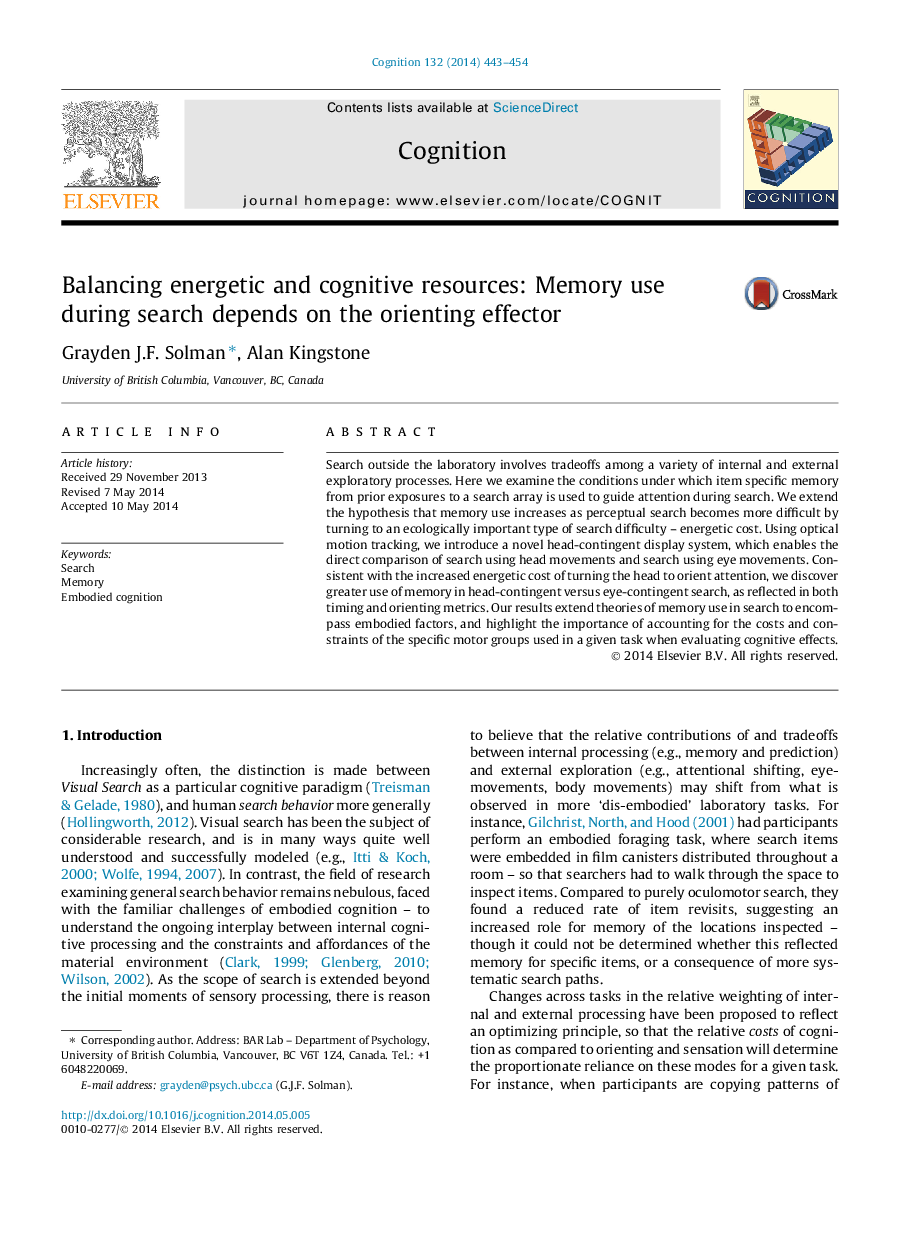| کد مقاله | کد نشریه | سال انتشار | مقاله انگلیسی | نسخه تمام متن |
|---|---|---|---|---|
| 10457535 | 921842 | 2014 | 12 صفحه PDF | دانلود رایگان |
عنوان انگلیسی مقاله ISI
Balancing energetic and cognitive resources: Memory use during search depends on the orienting effector
ترجمه فارسی عنوان
تعادل منابع پر انرژی و شناختی: استفاده از حافظه در حین جستجو بستگی به عملگر متمرکز دارد
دانلود مقاله + سفارش ترجمه
دانلود مقاله ISI انگلیسی
رایگان برای ایرانیان
کلمات کلیدی
جستجو کردن، حافظه، شناخت تجمعی،
ترجمه چکیده
جستجو در خارج از آزمایشگاه شامل اختلافات بین انواع فرآیندهای اکتشافی داخلی و خارجی می شود. در اینجا شرایطی را بررسی می کنیم که در آن حافظه خاصی از مواجهه قبلی با یک آرایه جستجو برای هدایت توجه در طی جستجو استفاده می شود. ما فرضیه افزایش استفاده از حافظه را افزایش می دهیم زیرا جستجوی ادراک با تبدیل به یک نوع مهم از نظر اکولوژیکی مشکل جستجو - هزینه های پر انرژی می شود. با استفاده از ردیابی حرکتی نوری، ما یک سیستم نمایش صفحه نمایش مشروط جدید ارائه می دهیم که امکان مقایسه مستقیم جستجو با استفاده از حرکات سر و جستجو را با استفاده از حرکات چشم فراهم می کند. با توجه به افزایش هزینه های پر انرژی برای تبدیل شدن سر به توجه، ما استفاده بیشتر از حافظه در سرنشینان در مقایسه با جستجو مشروط به چشم، استفاده می شود، که در هر دو زمان و معیارهای جهت گیری منعکس شده است. نتایج ما گسترش نظریه های استفاده از حافظه در جستجوی برای در نظر گرفتن عوامل تجسم شده و برجسته کردن اهمیت حسابداری برای هزینه ها و محدودیت های گروه های موتور خاص مورد استفاده در یک کار مشخص در هنگام ارزیابی اثرات شناختی.
موضوعات مرتبط
علوم زیستی و بیوفناوری
علم عصب شناسی
علوم اعصاب شناختی
چکیده انگلیسی
Search outside the laboratory involves tradeoffs among a variety of internal and external exploratory processes. Here we examine the conditions under which item specific memory from prior exposures to a search array is used to guide attention during search. We extend the hypothesis that memory use increases as perceptual search becomes more difficult by turning to an ecologically important type of search difficulty - energetic cost. Using optical motion tracking, we introduce a novel head-contingent display system, which enables the direct comparison of search using head movements and search using eye movements. Consistent with the increased energetic cost of turning the head to orient attention, we discover greater use of memory in head-contingent versus eye-contingent search, as reflected in both timing and orienting metrics. Our results extend theories of memory use in search to encompass embodied factors, and highlight the importance of accounting for the costs and constraints of the specific motor groups used in a given task when evaluating cognitive effects.
ناشر
Database: Elsevier - ScienceDirect (ساینس دایرکت)
Journal: Cognition - Volume 132, Issue 3, September 2014, Pages 443-454
Journal: Cognition - Volume 132, Issue 3, September 2014, Pages 443-454
نویسندگان
Grayden J.F. Solman, Alan Kingstone,
